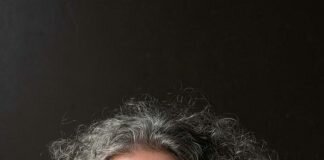Part memoir, part essay collection, ‘Leaving Isn’t the Hardest Thing’ is a fearless book.
But the truth I know is the memory of a memory and a story I’ve told myself to make sense of it all.” Lauren Hough tells us this at the very beginning of her essay collection, Leaving Isn’t the Hardest Thing. The book almost feels like a memoir, and I wonder if she hasn’t avoided calling the book a memoir because of the trick of memory that she lays out to readers at the very opening of the book, in the Author’s Note. She confesses, of the essays to come, “They’re stories I’ve told myself so many times that I’ve added lines and deleted people.” This is a powerful truth that sets the stage well for what is to come in Hough’s book. In this book, she holds nothing back, but offers an account of her life that is boldly and beautifully honest.

Hough grew up as a member of the infamous Children of God cult. As a result, she lived all over the globe as part of “the Family,” but was frequently separated from her own siblings as a child as the cult did its best to strip her of any sense of self, any firm identity. As an adult, her identities varied, ranging from an airman in the U.S. Air Force to a green-aproned barista, to a bouncer in a nightclub in the D.C. area for some time to her notable longest gig: as a cable guy in the Greater D.C. Area where she, at one point, is called out to the home of Dick Cheney. Ultimately, she must leave all of those identities behind to become her true self, and we get to come along for the journey.
Part memoir, part essay collection, Leaving Isn’t the Hardest Thing is a fearless book. Hough pulls back the curtain and offers us the good, the bad, the ugly. Over the course of the book, the full picture of her childhood in a cult is revealed, with details sprinkled across various essays. We come to see not only the scale and intensity of the cult, but also its lasting impact on her life. The form and effect of the essays, and their order, help us, the reader, to make sense of it all just as Hough is using words on a page to piece everything together for herself so that she can come out of the other side and find a life worth living. Though her story is singular and quite unique (not many of us were raised in cults), her writing and the truths she offers make her story relatable. As readers, we can see ourselves in her story, while honoring the profound differences between her story and ours.
Hers is a story of survival, yes, but it stretches well beyond that and becomes a story of discovery and, ultimately, hope. Her rape, by a member of the military in the woods near the beach where a group of airmen had been hanging out and drinking, is given just one paragraph out of 306 pages. Like everything else in the book, it is handled deftly. We get this one paragraph in the middle of the book, a glimpse of this awful moment, and then it doesn’t rear its ugly head again until the end as she comes to see that her life must change for her to truly be free. The trauma of that rape, piled upon so many others, is something she can’t free herself from within the confines of her current life as a cable guy.
“When you leave a situation like that, like The Family, you think, ‘Okay. I’ll be safe now,” but even outside of The Family, she wasn’t safe. Hough comes to terms with the fact that she may never truly be safe, but finds a way to finally be free. “Writing my way out of a nightmare,” she notes and through her words and her deep honesty, she offers something powerful to us as well. She shows us that we, too, can “write” our way out of our own nightmares. We can make changes in our own lives that will move us ourselves closer to our own freedom. She lays bare the ways in which societal constraints and pressures, media manipulation and structures of systemic oppression do their best to strip us of our identities. She recognizes the ways in which these systems mirror the strategies utilized by the cult that she was raised in.
“Those who write the rules will always give themselves an advantage over those who are other,” she reminds us and her life story bears this out. Constant groping and sexual harassment at the bar where she works as a bouncer, toxic relationships with girlfriends and lovers, time spent in solitary confinement in an essay that conveys the true brutality of the U.S. criminal justice system. Yes, she gains freedom from the Family and does her best to be a part of “the system” that the Family railed against. But, in the end, it is this system that makes her compliant, still keeps her from an identity that she can embrace. It is this system which she must push against to truly be free.
Her story is at once unique and wholly American. We travel the country with her and get an honest view of poverty in America, the criminalization of poverty, the oppression of women, homophobia, racism, classism and all of the rest. Yet because of Hough’s writing skill and the sense of humor that her life experiences seemed to require for survival, the book doesn’t feel heavy or dark. She includes moments of fun and joy as well. We see healthy friendships too and family reconciliation. We get to know the Texas grandmother who loved and accepted her for who she is even before she had fully stepped into herself. She offers us hope so that we, too, can navigate a challenging world and gives us critical advice as she reflects on how she survived it all. “You stock up so some part of you knows and remembers, even in the dark, all that’s worth saving in this world.”
Finally, she shares her dreams with us. “I don’t dream of a home and a family, a career and financial stability. I dream of living.” Through her commitment to her dream, we can begin to build a dream of our own.
LEAVING ISN’T THE HARDEST THING
By Lauren Hough
Vintage. $16.95.
Purchase on Bookshop (which supports independent bookstores and Survivor Lit, a nonprofit literary magazine for sexual assault survivors) or anywhere books are sold.













